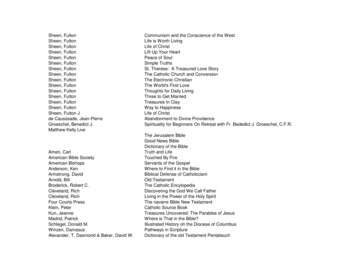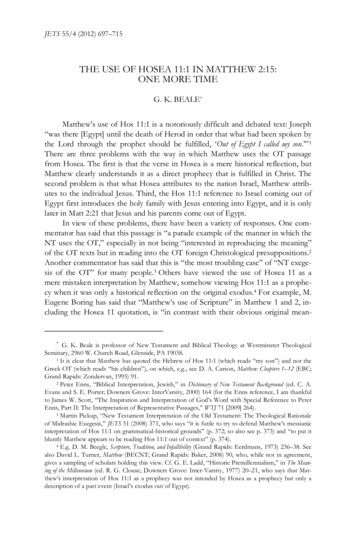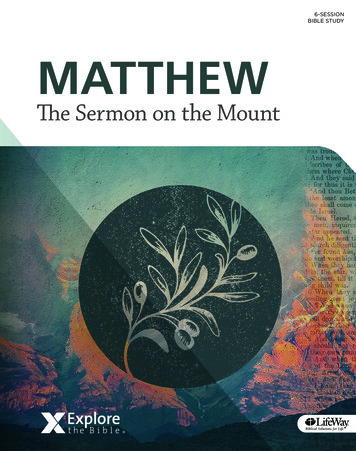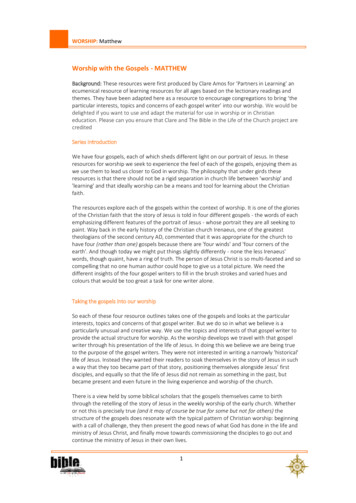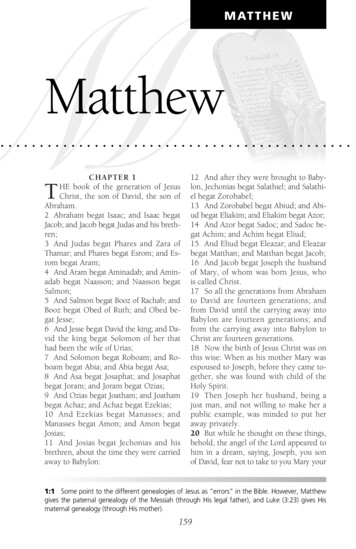
Transcription
MM AT T H E WMatthew.CHAPTER 1HE book of the generation of JesusChrist, the son of David, the son ofAbraham.2 Abraham begat Isaac; and Isaac begatJacob; and Jacob begat Judas and his brethren;3 And Judas begat Phares and Zara ofThamar; and Phares begat Esrom; and Esrom begat Aram;4 And Aram begat Aminadab; and Aminadab begat Naasson; and Naasson begatSalmon;5 And Salmon begat Booz of Rachab; andBooz begat Obed of Ruth; and Obed begat Jesse;6 And Jesse begat David the king; and David the king begat Solomon of her thathad been the wife of Urias;7 And Solomon begat Roboam; and Roboam begat Abia; and Abia begat Asa;8 And Asa begat Josaphat; and Josaphatbegat Joram; and Joram begat Ozias;9 And Ozias begat Joatham; and Joathambegat Achaz; and Achaz begat Ezekias;10 And Ezekias begat Manasses; andManasses begat Amon; and Amon begatJosias;11 And Josias begat Jechonias and hisbrethren, about the time they were carriedaway to Babylon:T12 And after they were brought to Babylon, Jechonias begat Salathiel; and Salathiel begat Zorobabel;13 And Zorobabel begat Abiud; and Abiud begat Eliakim; and Eliakim begat Azor;14 And Azor begat Sadoc; and Sadoc begat Achim; and Achim begat Eliud;15 And Eliud begat Eleazar; and Eleazarbegat Matthan; and Matthan begat Jacob;16 And Jacob begat Joseph the husbandof Mary, of whom was born Jesus, whois called Christ.17 So all the generations from Abrahamto David are fourteen generations; andfrom David until the carrying away intoBabylon are fourteen generations; andfrom the carrying away into Babylon toChrist are fourteen generations.18 Now the birth of Jesus Christ was onthis wise: When as his mother Mary wasespoused to Joseph, before they came together, she was found with child of theHoly Spirit.19 Then Joseph her husband, being ajust man, and not willing to make her apublic example, was minded to put heraway privately.20 But while he thought on these things,behold, the angel of the Lord appeared tohim in a dream, saying, Joseph, you sonof David, fear not to take to you Mary your1:1 Some point to the different genealogies of Jesus as “errors” in the Bible. However, Matthewgives the paternal genealogy of the Messiah (through His legal father), and Luke (3:23) gives Hismaternal genealogy (through His mother).159
Matthew 1160wife: for that which is conceived in heris of the Holy Spirit.21 And she shall bring forth a son, andyou shall call his name JESUS: for he shallsave his people from their sins.22 Now all this was done, that it mightbe fulfilled which was spoken of the Lordby the prophet, saying,23 Behold, a virgin shall be with child,and shall bring forth a son, and they shallcall his name Emmanuel, which being interpreted is, God with us.24 Then Joseph being raised from sleepdid as the angel of the Lord had biddenhim, and took to him his wife:25 And knew her not till she had broughtforth her firstborn son: and he called hisname JESUS.CHAPTER 2OW when Jesus was born in Bethlehem of Judea in the days of Herod the king, behold, there came wise menfrom the east to Jerusalem,2 Saying, Where is he that is born Kingof the Jews? for we have seen his star inthe east, and are come to worship him.3 When Herod the king had heard thesethings, he was troubled, and all Jerusalemwith him.4 And when he had gathered all the chiefpriests and scribes of the people together,he demanded of them where Christ shouldbe born.5 And they said to him, In Bethlehem ofJudea: for thus it is written by the prophet,6 And you Bethlehem, in the land of Ju-Ndah, are not the least among the princesof Judah: for out of you shall come a Governor, that shall rule my people Israel.7 Then Herod, when he had privatelycalled the wise men, inquired of them diligently what time the star appeared.8 And he sent them to Bethlehem, andsaid, Go and search diligently for theyoung child; and when you have foundhim, bring me word again, that I maycome and worship him also.9 When they had heard the king, theydeparted; and, lo, the star, which they sawin the east, went before them, till it cameand stood over where the young child was.10 When they saw the star, they rejoicedwith exceeding great joy.11 And when they were come into thehouse, they saw the young child with Maryhis mother, and fell down, and worshipped him: and when they had openedtheir treasures, they presented to him gifts;gold, and frankincense, and myrrh.12 And being warned of God in a dreamthat they should not return to Herod, theydeparted into their own country anotherway.13 And when they were departed, behold, the angel of the Lord appeared to Joseph in a dream, saying, Arise, and takethe young child and his mother, and fleeinto Egypt, and be there until I bring youword: for Herod will seek the young childto destroy him.14 When he arose, he took the youngchild and his mother by night, and departed into Egypt:1:20–23 Some say this was not a “virgin” but merely a “young maiden.” Isaiah 7:14 says thatGod Himself will give a “sign.” A young maiden becoming pregnant is not a sign from God, but aneveryday occurrence. A virgin conceiving is a supernatural sign. See also Luke 1:31–35.2:1 Wise men still seek Him. How is it that these wise men, who were not Jews, were aware ofthe birth of the “King of the Jews”? That they not only understood who He was, but desired toworship Him (v. 2) shows that God is able to reveal Himself to people in all lands and call them toHimself. These wise men “rejoiced with exceeding great joy” as God used a star to guide them tothe Christ Child, then they “fell down and worshiped Him” (vv. 9–11). They made great personaland financial sacrifices to see this Child: they traveled a great distance, spent months away fromtheir homes, and gave extravagant gifts to this newborn King.Those who are wise today will listen for His voice, follow His guidance, and be willing to sacrifice everything for so great a privilege as meeting the King. See Philippians 3:8.
16115 And was there until the death of Herod: that it might be fulfilled which wasspoken of the Lord by the prophet, saying,Out of Egypt have I called my son.16 Then Herod, when he saw that hewas mocked of the wise men, was exceeding wroth, and sent forth, and slewall the children that were in Bethlehem,and in all the coasts thereof, from twoyears old and under, according to the timewhich he had diligently inquired of thewise men.17 Then was fulfilled that which wasspoken by Jeremiah the prophet, saying,18 In Rama was there a voice heard, lamentation, and weeping, and great mourning, Rachel weeping for her children, andwould not be comforted, because they arenot.19 But when Herod was dead, behold, anangel of the Lord appeared in a dream toJoseph in Egypt,20 Saying, Arise, and take the young childand his mother, and go into the land ofMatthew 3Israel: for they are dead which soughtthe young child’s life.21 And he arose, and took the youngchild and his mother, and came into theland of Israel.22 But when he heard that Archelaus didreign in Judea in the room of his fatherHerod, he was afraid to go there: notwithstanding, being warned of God in a dream,he turned aside into the parts of Galilee:23 And he came and dwelt in a city calledNazareth: that it might be fulfilled whichwas spoken by the prophets, He shall becalled a Nazarene.CHAPTER 3N those days came John the Baptist,preaching in the wilderness of Judea,2 And saying, Repent: for the kingdomof heaven is at hand.3 For this is he that was spoken of by theprophet Isaiah, saying, The voice of onecrying in the wilderness, Prepare the wayof the Lord, make his paths straight.I3:1 Open-air preaching. John the Baptist was an open-air preacher. Jesus was an open-airpreacher. He preached the greatest sermon of all time, the “Sermon on the Mount” in the openair. Peter preached in the open-air at Pentecost and Paul chose to stand on Mars Hill and preachopen-air to the Athenians.If we are serious about reaching this world, let us follow in the footsteps of Jesus and the apostles and preach where sinners gather. In thirty minutes, a good open-air preacher can reach moresinners than the average church does in twelve months.Thank God that the disciples didn’t stay in the upper room. They didn’t carpet the building, padthe pews then put a notice outside the front door saying, “Tonight: Gospel outreach service, 7 P.M.—all welcome.” They went into the open air.The gospel is for the world, not the Church. One-third of the word “gospel” is “go.” Twothirds of “God” is “go”; but like King Og, we seem to have it backwards. We take sinners to meetings rather than meetings to sinners. The Church prefers to fish on dry land rather than get its feetwet. Charles Finney put his finger on the reason why: “It is the great business of every Christian tosave souls. People complain that they do not know how to take hold of this matter. Why, the reason is plain enough; they have never studied it. They have never taken the proper pains to qualifythemselves for the work. If you do not make it a matter of study, how you may successfully act inbuilding up the kingdom of Christ, you are acting a very wicked and absurd part as a Christian.”He who loves his neighbor as himself will be concerned for his eternal welfare. He who couldn’tcare less that every day multitudes of living people are being swallowed by the jaws of hell has aheart of stone indeed.3:2 Repentance—its necessity for salvation. The first word John the Baptist preached to Israelwas “repent.” However, it must be remembered that Israel had the Law and therefore had the“knowledge of sin” (Romans 7:7). Unregenerate humanity needs the Moral Law to show themwhat sin is (1 John 3:4). Without the knowledge that the “schoolmaster” brings, they remain in ignorance about sin’s true nature and therefore their need for biblical repentance. See Luke 13:2.
Matthew 31624 And the same John had his raiment ofcamel’s hair, and a leathern girdle abouthis loins; and his meat was locusts andwild honey.5 Then went out to him Jerusalem, andall Judea, and all the region round aboutJordan,6 And were baptized of him in Jordan,confessing their sins.7 But when he saw many of the Pharisees and Sadducees come to his baptism,he said to them, O generation of vipers,who has warned you to flee from thewrath to come?8 Bring forth therefore fruits meet forrepentance:9 And think not to say within yourselves, We have Abraham to our father:for I say to you, that God is able of thesestones to raise up children to Abraham.10 And now also the axe is laid to theroot of the trees: therefore every tree whichbrings not forth good fruit is hewn down,and cast into the fire.11 I indeed baptize you with water torepentance: but he that comes after me ismightier than I, whose shoes I am notworthy to bear: he shall baptize you withthe Holy Spirit, and with fire:12 Whose fan is in his hand, and he willthoroughly purge his floor, and gatherhis wheat into the garner; but he willburn up the chaff with unquenchable fire.13 Then came Jesus from Galilee to Jordan to John, to be baptized of him.14 But John forbad him, saying, I haveneed to be baptized of you, and you cometo me?15 And Jesus answering said to him, Suffer it to be so now: for thus it becomes usto fulfil all righteousness. Then he sufferedhim.16 And Jesus, when he was baptized,went up straightway out of the water: and,lo, the heavens were opened to him, andhe saw the Spirit of God descending likea dove, and lighting upon him:17 And lo a voice from heaven, saying,This is my beloved Son, in whom I amwell pleased.CHAPTER 4HEN was Jesus led up of the Spirit into the wilderness to be tempted of thedevil.2 And when he had fasted forty days andforty nights, he was afterward an hungered.3 And when the tempter came to him,he said, If you are the Son of God, command that these stones be made bread.4 But he answered and said, It is written, Man shall not live by bread alone, butby every word that proceeds out of themouth of God.5 Then the devil took him up into theholy city, and set him on a pinnacle of thetemple,6 And said to him, If you are the Son ofGod, cast yourself down: for it is written,He shall give his angels charge concerning you: and in their hands they shall bearyou up, lest at any time you dash your footagainst a stone.7 Jesus said to him, It is written again,You shall not tempt the Lord your God.8 Again, the devil took him up into anexceeding high mountain, and showedhim all the kingdoms of the world, andthe glory of them;9 And said to him, All these things willI give you, if you will fall down and worship me.10 Then said Jesus to him, Get you hence,Satan: for it is written, You shall worshipthe Lord your God, and him only shall youserve.11 Then the devil left him, and, behold,angels came and ministered to him.12 Now when Jesus had heard that Johnwas cast into prison, he departed into Galilee;T4:6 “The devil can cite Scripture for his purpose.” William Shakespeare4:9 The devil tempted Jesus to become a Satan worshiper.
1634:4Matthew 4Archaeology and History Attest to the Reliabilityof the BibleBy Richard M. Fales, Ph.D.No other ancient book is questioned or maligned like the Bible. Critics looking for the flyspeck in the masterpiece allege that there wasa long span between the time the events inthe New Testament occurred and when theywere recorded. They claim another gap existsarchaeologically between the earliest copiesmade and the autographs of the New Testament. In reality, the alleged spaces and socalled gaps exist only in the minds of the critics.Manuscript Evidence. Aristotle’s Ode toPoetics was written between 384 and 322 B.C.The earliest copy of this work dates A.D. 1100,and there are only forty-nine extant manuscripts. The gap between the original writingand the earliest copy is 1,400 years. There areonly seven extant manuscripts of Plato’s Tetralogies, written 427–347 B.C. The earliestcopy is A.D. 900—a gap of over 1,200 years.What about the New Testament? Jesus wascrucified in A.D. 30. The New Testament waswritten between A.D. 48 and 95. The oldestmanuscripts date to the last quarter of thefirst century, and the second oldest A.D. 125.This gives us a narrow gap of thirty-five toforty years from the originals written by theapostles.From the early centuries, we have some5,300 Greek manuscripts of the New Testament. Altogether, including Syriac, Latin, Coptic, and Aramaic, we have a whopping 24,633texts of the ancient New Testament to confirmthe wording of the Scriptures. So the bottomline is, there was no great period between theevents of the New Testament and the NewTestament writings. Nor is there a great timelapse between the original writings and theoldest copies. With the great body of manuscript evidence, it can be proved, beyond adoubt, that the New Testament says exactlythe same things today as it originally did nearly 2,000 years ago.Corroborating Writings. Critics alsocharge that there are no ancient writings aboutJesus outside the New Testament. This is another ridiculous claim. Writings confirming Hisbirth, ministry, death, and resurrection includeFlavius Josephus ( A . D . 93), the BabylonianTalmud (A.D. 70–200), Pliny the Younger’s let-ter to the Emperor Trajan (approx. A.D. 100),the Annals of Tacitus (A.D. 115–117), MaraBar Serapion (sometime after A.D. 73), andSuetonius’ Life of Claudius and Life of Nero(A.D. 120). Another point of contention ariseswhen Bible critics have knowingly or unknowingly misled people by implying that Old andNew Testament books were either excludedfrom or added into the canon of Scripture atthe great ecumenical councils of A.D. 336, 382,397, and 419. In fact, one result of these gatherings was to confirm the Church’s belief thatthe books already in the Bible were divinely inspired. Therefore, the Church, at these meetings, neither added to nor took away from thebooks of the Bible. At that time, the thirty-nineOld Testament books had already been accepted, and the New Testament, as it was written, simply grew up with the ancient Church.Each document, being accepted as it waspenned in the first century, was then passedon to Christians of the next century. So, thisfoolishness about the Roman Emperor Constantine dropping books from the Bible is simply uneducated rumor.Fulfilled Prophecies. Prophecies from theOld and New Testaments that have been fulfilled also add credibility to the Bible. TheScriptures predicted the rise and fall of greatempires like Greece and Rome (Daniel 2:39,40), and foretold the destruction of cities likeTyre and Sidon (Isaiah 23). Tyre’s demise isrecorded by ancient historians, who tell howAlexander the Great lay siege to the city forseven months. King Nebuchadnezzar of Babylon had failed in a 13-year attempt to capturethe seacoast city and completely destroy its inhabitants. During the siege of 573 B.C., muchof the population of Tyre moved to its new island home approximately half a mile from theland city. Here it remained surrounded bywalls as high as 150 feet until judgment fell in332 B.C. with the arrival of Alexander theGreat. In the seven-month siege, he fulfilledthe remainder of the prophecies (Zechariah9:4; Ezekiel 26:12) concerning the city at seaby completely destroying Tyre, killing 8,000 ofits inhabitants and selling 30,000 of its population into slavery. To reach the island, he(continued on next page)
Matthew 4164(4:4 continued)scraped up the dust and rubble of the old landcity of Tyre, just like the Bible predicted, andcast them into the sea, building a 200-footwide causeway out to the island.Alexander’s death and the murder of histwo sons was also foretold in the Scripture.Another startling prophecy was Jesus’ detailedprediction of Jerusalem’s destruction, and thefurther spreading of the Jewish diasporathroughout the world, which is recorded inLuke 21. In A.D. 70, not only was Jerusalemdestroyed by Titus, the future emperor ofRome, but another prediction of Jesus Christ inMatthew 24:1,2 came to pass—the completedestruction of the temple of God.Messianic Prophecies. In the Book of Daniel, the Bible prophesied the coming of theone and only Jewish Messiah prior to the temple’s demise. The Old Testament prophets declared He would be born in Bethlehem (Micah5:2) to a virgin (Isaiah 7:14), be betrayed forthirty pieces of silver (Zechariah 11:12,13), dieby crucifixion (Psalm 22), and be buried in a richman’s tomb (Isaiah 53:9). There was only oneperson who fits all of the messianic propheciesof the Old Testament who lived before A.D. 70:Jesus of Nazareth, the Son of Mary.Yes, the Bible is an amazing book. (Seealso 1 Peter 1:25 footnote.)13 And leaving Nazareth, he came anddwelt in Capernaum, which is upon thesea coast, in the borders of Zabulon andNephthalim:14 That it might be fulfilled which wasspoken by Isaiah the prophet, saying,15 The land of Zabulon, and the land ofNephthalim, by the way of the sea, beyond Jordan, Galilee of the Gentiles;16 The people which sat in darknesssaw great light; and to them which satin the region and shadow of death lightis sprung up.17 From that time Jesus began to preach,and to say, Repent: for the kingdom ofheaven is at hand.18 And Jesus, walking by the sea of Galilee, saw two brethren, Simon called Peter,and Andrew his brother, casting a netinto the sea: for they were fishers.19 And he said to them, Follow me, and Iwill make you fishers of men.20 And they straightway left their nets,and followed him.21 And going on from there, he saw other two brethren, James the son of Zebedee, and John his brother, in a ship withZebedee their father, mending their nets;and he called them.22 And they immediately left the shipand their father, and followed him.23 And Jesus went about all Galilee,teaching in their synagogues, and preaching the gospel of the kingdom, and healing all manner of sickness and all manner of disease among the people.24 And his fame went throughout allSyria: and they brought to him all sickpeople that were taken with divers diseasesand torments, and those which were possessed with devils, and those which werelunatic, and those that had the palsy; andhe healed them.25 And there followed him great multitudes of people from Galilee, and fromDecapolis, and from Jerusalem, and fromJudea, and from beyond Jordan.CHAPTER 5ND seeing the multitudes, he wentup into a mountain: and when he wasset, his disciples came to him:2 And he opened his mouth, and taughtthem, saying,A4:16 This life is the valley of the shadow of death. Sinners sit in darkness—waiting to die. Thelight of the Savior banishes the shadow of death.4:17 Like John the Baptist, Jesus’ first word in preaching to Israel was “repent.” Israel already hadthe “knowledge of sin” (which only the Law can bring), but now they needed to repent—to turnfrom their sins as revealed by the Law.
1655:1Matthew 5The Sermon on the MountThis sermon not only reveals God’s divine nature, it puts into our hands the most powerfulof evangelistic weapons. It is the greatest evangelistic sermon ever preached by the greatestevangelist who ever lived. The straightedge ofGod’s Law reveals how crooked we are:v. 3: The unregenerate heart isn’t poor inspirit. It is proud, self-righteous, and boastful(every man is pure in his own eyes—Proverbs16:2).v. 4: The unsaved don’t mourn over theirsin; they love the darkness and hate the light(John 3:19).v. 5: The ungodly are not meek and lowlyof heart. Their sinful condition is described inRomans 3:13–18.v. 6: Sinners don’t hunger and thirst afterrighteousness. Instead, they drink iniquity likewater (Job 15:16).v. 7: The world is shallow in its ability toshow true mercy. It is by nature cruel and vindictive (Genesis 6:5).v. 8: The heart of the unregenerate is notpure; it is desperately wicked (Jeremiah 17:9).Those who are born again manifest thefruit of the Spirit, live godly in Christ Jesus (vv.3–9), and therefore suffer persecution (vv.10–12). However, their purpose on earth is tobe salt and light: to be a moral influence, andto bring the light to those who sit in the shadow of death (vv. 13–16).Look now at how the Messiah expoundsthe Law and makes it “honorable” (Isaiah42:21). He establishes that He didn’t come todestroy the Law (v. 17); not even the smallestpart of it will pass away (v. 18). It will be thedivine standard of judgment (James 2:12;Romans 2:12; Acts 17:31). Those who teach it“shall be called great in the kingdom of heaven” (v. 19). The Law should be taught to sinners because it was made for them (1 Timothy1:8–10), and is a “schoolmaster” that bringsthe “knowledge of sin” (Romans 3:19,20; 7:7).Its function is to destroy self-righteousnessand bring sinners to the cross (Galatians 3:24).The righteousness of the scribes and Pharisees was merely outward, but God requirestruth in the inward parts (Psalm 51:6). Jesusshows this by unveiling the Law’s spiritual nature (Romans 7:14). The Sixth Commandmentforbids murder. However, Jesus shows that italso condemns anger “without cause,” andeven evil-speaking (vv. 21–26): “Every idleword that men shall speak, they shall give anaccount thereof in the day of judgment”(Matthew 12:36). The Seventh Commandmentforbids adultery, but Jesus revealed that thisalso includes lust, and it even condemns divorce, except in the case of sexual sin of thespouse (vv. 27–32).Jesus opens up the Ninth Commandment(vv. 33–37), and then shows that love is thespirit of the Law—“The end of the commandment is charity out of a pure heart . . .” (1 Timothy 1:5). This is summarized in what is commonly called the Golden Rule: “All thingswhatsoever you would that men should do toyou, do you even so to them: for this is theLaw and the prophets” (Matthew 7:12, emphasis added). “Owe no man any thing, butto love one another: for he that loves anotherhas fulfilled the law. For this, You shall notcommit adultery, You shall not kill, You shallnot steal, You shall not bear false witness,You shall not covet; and if there be any othercommandment, it is briefly comprehended inthis saying, namely, You shall love your neighbor as yourself. Love works no ill to his neighbor: therefore love is the fulfilling of the law”(Romans 13:8–10).When a sinner is born again he is able todo this (vv. 38–47). He now possesses “the divine nature” (2 Peter 1:4). In Christ he is madeperfect and thus satisfies the demands of a“perfect” Law (Psalm 19:7; James 1:25). Without the righteousness of Christ he cannot beperfect as his Father in heaven is perfect (v.48). The Law annihilated his self-righteousnessleaving him undone and condemned. His onlyhope was in the cross of Jesus Christ. After hisconversion, knowledge of the Law thatbrought him there keeps him at the foot ofthe cross.John Wesley said, “Therefore I cannotspare the Law one moment, no more than Ican spare Christ, seeing I now want it as muchto keep me to Christ, as I ever wanted it tobring me to Him. Otherwise this ‘evil heart ofunbelief’ would immediately ‘depart from theliving God.’ Indeed each is continually sendingme to the other—the Law to Christ, and Christto the Law.”
Matthew 51663 Blessed are the poor in spirit: for theirsis the kingdom of heaven.4 Blessed are they that mourn: for theyshall be comforted.5 Blessed are the meek: for they shall inherit the earth. We have grasped the mystery of theatom and rejected the Sermon on theMount . . . The world has achieved brilliance without conscience. Ours is aworld of nuclear giants and ethicalinfants. GENERAL OMAR BRADLEY6 Blessed are they which do hunger andthirst after righteousness: for they shallbe filled.7 Blessed are the merciful: for they shallobtain mercy.8 Blessed are the pure in heart: for theyshall see God.9 Blessed are the peacemakers: for theyshall be called the children of God.10 Blessed are they which are persecuted for righteousness’ sake: for theirs isthe kingdom of heaven.11 Blessed are you, when men shall revile you, and persecute you, and shall sayall manner of evil against you falsely, formy sake.12 Rejoice, and be exceeding glad: forgreat is your reward in heaven: for so persecuted they the prophets which were before you.13 You are the salt of the earth: but if thesalt has lost his savour, wherewith shallit be salted? it is thenceforth good fornothing, but to be cast out, and to be trodden under foot of men.14 You are the light of the world. A city thatis set on an hill cannot be hid.15 Neither do men light a candle, and putit under a bushel, but on a candlestick; and5:2 Sin, righteousness, and judgment. “The Sermon on the Mount is the greatest example wehave of how to ‘reprove the world of sin, of righteousness, and of judgment.’ In Matthew chapter5, Christ reproves the multitudes of sin by showing the essence of the Law. In chapter 6, He teaches on true righteousness, the essence of which is to cause men to glorify our Father which is inheaven, not to draw attention to ourselves. Then, in chapter 7, He teaches concerning judgment.He warns the multitudes that if they judge others as guilty for doing the same things they themselves are practicing, instead of pulling the log out of their own eye first, they are obviously hypocrites. If we will follow this method of preaching the gospel, then we can expect the Holy Spirit tohelp us. For Jesus Himself promised that this divine Helper would reprove the world of sin, of righteousness, and of judgment. He does this by causing our words to make saving impressions on theminds of men.” Joel Crumpton5:6 We should come to the Savior thirsting for righteousness, not happiness as modern evangelism maintains—“Riches profit not in the day of wrath: but righteousness delivers from death”(Proverbs 11:4, emphasis added).5:7 Jesus didn’t come to destroy the Law and the prophets, but to fulfill them (Matthew 5:17). Itwas our transgressions that necessitated the Savior. If we hadn’t sinned, there would have been noneed for a sacrifice. We broke the Law, and Jesus paid the fine. God loved the world with such passion that He sent His only Son to the cross of Calvary, so that we might trust in Him alone. In sodoing, we would not perish under the wrath of His Law, but have everlasting life (John 3:16).5:13 “The pulpit, not the media, is to be the most powerful voice in our land.” Bill Gothard5:14 Set on a hill. Some people say that religion is a personal thing and it should be kept to oneself. However, Jesus tells us that the gospel of salvation is the good news of everlasting life and isfor this dying world. We should be set on a hill. We should be preaching on the housetops, liftingup our voice like a trumpet to show this people their transgression. The Bible tells us that God’sLaw is light (Proverbs 6:23). When the light of the Law and the glorious gospel of Christ shine together, they expose and banish the shadows of sin and death.
167Matthew 5POINTS FOR OPEN-AIR PREACHING5:10–12Never Fear HecklersThe best thing that can happen to an open-air meeting isto have a good heckler. Jesus gave us some of the greatest gems of Scripture because someone either made a statement or asked a question in an open-air setting. A good heckler can increase a crowd of 20 people to 200 in a matter of minutes. The air becomes electric. Suddenly, youhave 200 people listening intently to how you will answer a heckler. All you have to do isremember the attributes of 2 Timothy 2:23–26: be patient, gentle, humble, etc. Don’t worry ifyou can’t answer a question. Just say, “I can’t answer that, but I’ll try to get the answer for youif you really want to know.” With Bible “difficulties,” I regularly fall back on the powerful statement of Mark Twain: “Most people are bothered by those passages of Scripture they don’t understand, but for me I have always noticed that the passages that bother me are those I do understand.”A “good” heckler is one who will provoke your thoughts. He will stand up, speak up, thenshut up so that you can preach. Occasionally, you will get hecklers who have the first two qualifications, but they just won’t be quiet. If they will n
1:1 Some point to the different genealogies of Jesus as "errors" in the Bible. However, Matthew gives the paternal genealogy of the Messiah (through His legal father), and Luke (3:23) gives His maternal genealogy (through His mother). 159




